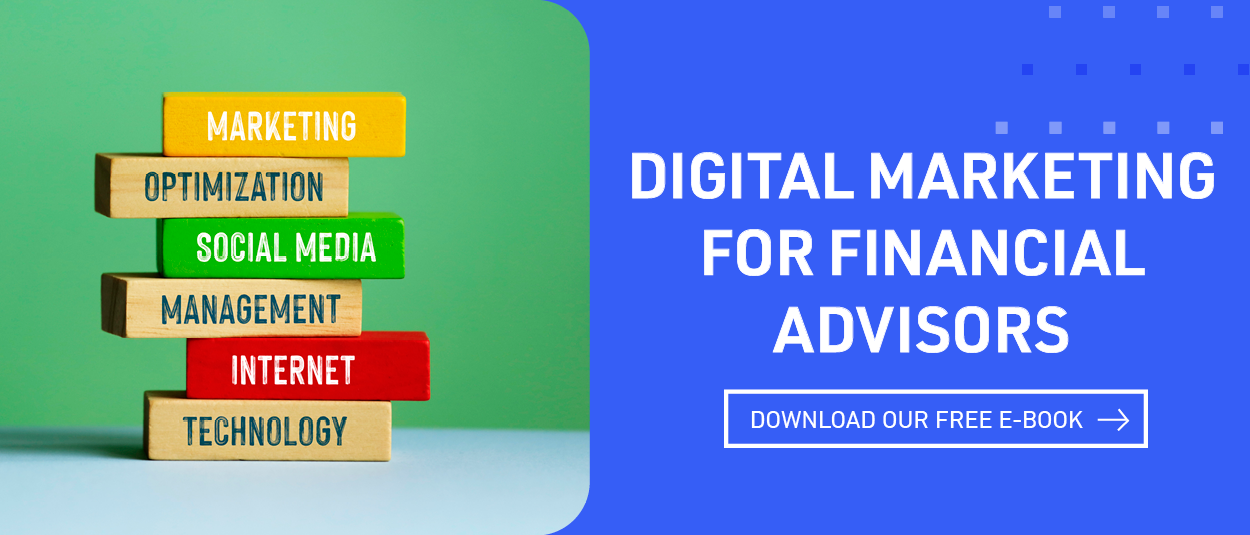10 Ways Financial Advisors Expand Their Digital Marketing in 2022
With 2021 nearly in the rearview mirror, many financial advisors are looking ahead to 2022 and the promise it holds to be a growth year for their firms and a positive experience for their clients. A big part of that success will come from having a solid financial advisor digital marketing plan for the year ahead.
And while it may seem daunting to look to next year while still wrapping up 2021, planning ahead is a key part of every financial advisor’s digital marketing success.
The development sequence is very straightforward. Investors you don’t know find you on the Internet. You offer something of value to compel them to contact you. At this point they are leads. The next step is to convert leads into active prospects that are based on mutual interests. The last step is converting prospects into revenue-producing clients.
Read on to learn how to kickstart your financial advisor digital marketing in 2022 to stay ahead of the competition and start the year with a solid strategy that produces the results you are seeking.
1) Enhance Your Email Marketing
Email marketing remains a key part of any financial advisor’s digital marketing campaign heading into 2022. Email marketing, if done correctly, can not only nurture current leads and produce new clients, it can also queue up new relationships for the future. Building rapport with investors you know is an essential part of any digital marketing strategy.
As a lead generation tactic, having prominent email signup CTAs on your website and gating your content behind a form (with proper email opt-in language) can grow your prospect list and enable you to nurture them through your sales funnel and convert them into active prospects. Some of the more involved email platforms allow for new client onboarding, which speaks to the point above about making the most of relationships with existing leads.
2) Social Media
This channel shows no signs of slowing down anytime soon, and financial advisors who don’t get on board with social media run the risk of becoming irrelevant to current and future generations of investors. While some of the social media trends may seem foreign or irrelevant, connecting with these audiences is crucial to maintaining a successful financial advisor business both now and in the future.
It pays to become knowledgeable on at least the social media basics, including trending topics and the latest buzzwords and memes.
Pro tip: Don’t share “viral” content without doing your due diligence just to get exposure. Some viral content can be offensive or not convey the right messages for your firm. In this case, it pays to be “in the know” on what’s popular on social platforms.
3) Virtual Events
While the pandemic brought with it many negatives, there are some positive takeaways as well. Virtual events are arguably one of those positives. Before 2020, virtual events were a novelty more than an everyday occurrence. When the investors were forced to social distance, only those digital marketers who embraced the virtual aspect of business saw significant success, whereas those who didn’t move quickly enough were left behind.
And while financial advisors with a local footprint have traditionally been more comfortable with face-to-face client engagement, that became more limited and made online meetings a necessity. Now that the world is slowly reopening, many financial advisors are seeing the benefits of virtual meetings – pandemic or not – because of the efficiency and convenience it provides for their prospects, clients, and themselves.
4) Budget Appropriately
Having a realistic digital marketing budget is crucial for starting 2022 off on the right foot. The key word is realistic. Without having accurate costs for the different parts of a digital marketing campaign, financial advisors are at risk of shortchanging their efforts and running out of money when there are several months left in the year. You can avoid this by taking the time to accurately estimate costs and build those costs into a budget that is manageable for your financial advisor business.
5) Be Flexible
While planning ahead is a key part of digital marketing success, flexibility is just as important. If 2020 taught us anything, it’s that marketing strategies can change very quickly, and being able to pivot is a necessary business tactic.
Being flexible and willing to adapt and possibly change direction on your original digital marketing plan can be the difference between a successful 2022 and a year with limited results.
6) Double Down on Local
If your financial advising business has a local focus, embrace it as much as possible. Consumers are increasingly looking for ways to engage with local businesses, and financial advisors can take advantage of this when it comes to competition from large national firms. From a digital marketing standpoint, investing in local SEO and listings (such as Google My Business) are key ways to establish a local presence.
7) Content
Content is still king, which means financial advisors need to continue to produce and promote quality content that is both relevant and timely. One way to achieve this is to create a content calendar for the year. Will it change? Absolutely. But having a plan based on the seasonality of financial advising products and services as well as your personal availability helps keep you on track and avoid scrambling for the next great idea for a blog article, pillar page, or eBook.
8) Stay on Google’s Radar
More than just a search engine, utilizing Google’s family of products is critical to financial advisor digital marketing success. From SEO enhancements using Google’s Keyword Planner to Google My Business and becoming Google Screened on Local Service Listings, staying relevant to Google is a must for financial advisors who want to grow their online presence in 2022 and beyond.
9) Invest in the Right Technology
Yes, it’s a cliché – but it’s true that it takes money to make money. And when it comes to digital marketing, sometimes the free version doesn’t cut it. Whether it’s quality video equipment
or upgrading email or CRM software, having the right tools is paramount for a successful digital marketing campaign. As financial advisors, this may be a hard pill to swallow when looking at the costs for enhanced software or equipment, but it can also be a worthy investment in the future of your financial advisor firm.
10) Find the Right Digital Marketing Partner
While every one of the tips in this article can be executed by financial advisors with little or no digital marketing skills, it isn’t necessarily the ideal solution. You have to consider the highest and best use of the advisors’ time. Plus, very few advisors have all of the digital marketing professionals they need in-house. Therefore, it makes sense to outsource the work to a top-notch digital marketing agency that knows your industry - that is, the agency knows how to reach investors on the Internet and convert them into leads for financial advisors.
By partnering with the right digital marketing agency, you can delegate the work to a team of dedicated professionals who do all of the work for you - increasing the odds 2022 will be your best year ever for adding new clients.


